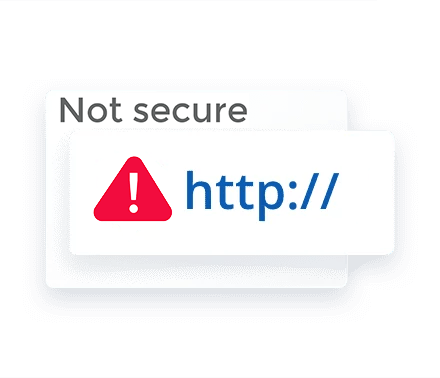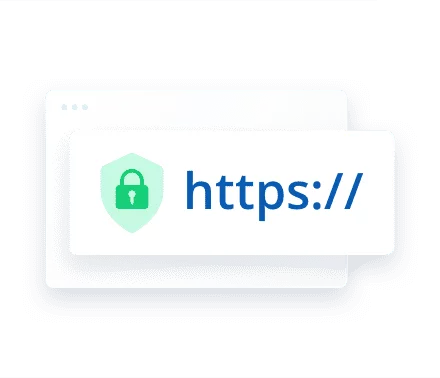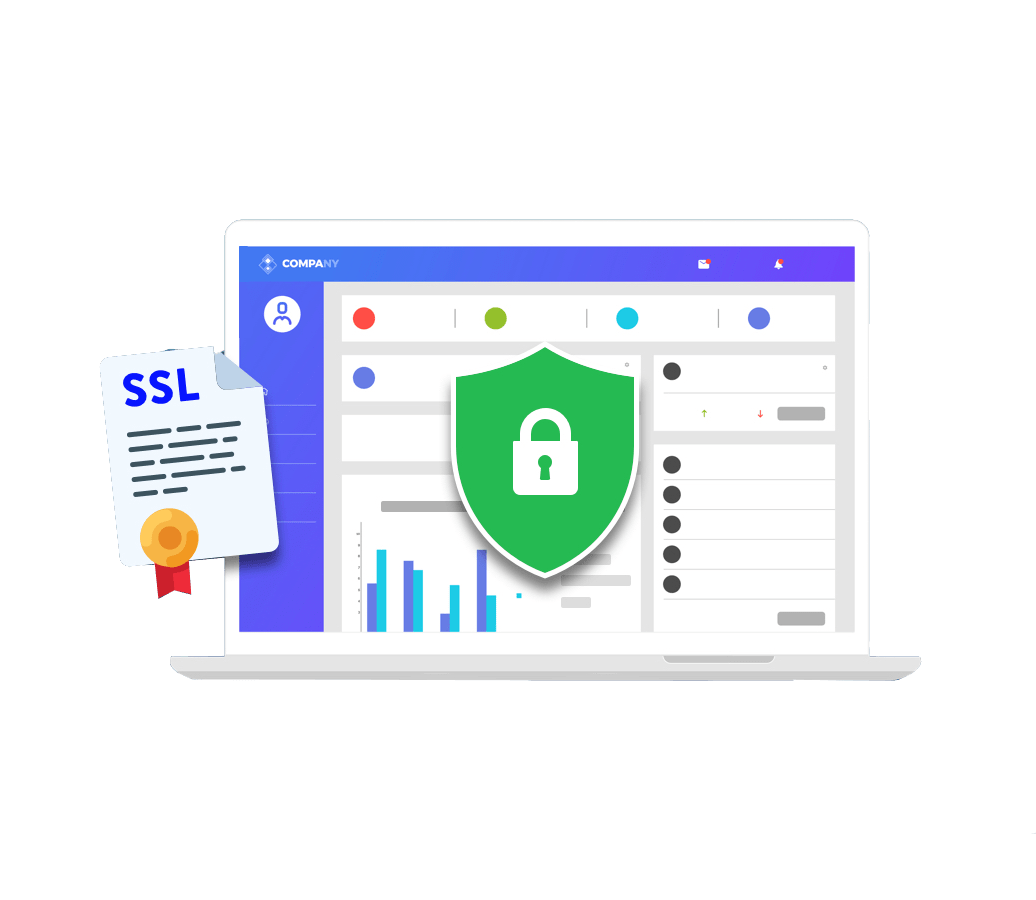SSL certificates
Protect your website with WebTier SSL Certificates
Your HTTPS site is more secure and reliable
Encryption ensures the protection of sensitive data in transit, offering authenticity and security. Improve SEO and conversions thanks to HTTPS protocols, demonstrating a commitment to quality and IT security.
Quick release
Secured in HTTPS
Recognized as safe
TLS certificate with Let's Encrypt. Wildcard SSL Certificate
THE SSL certificates they allow you to use encryption to protect the data transmitted by your website, increase the trust of your customers and improve your positioning on search engines. The latter give priority in the SERP to the websites that can be reached through the HTTPS protocol. Choosing the right SSL certificate makes transactions to and from your site easier safe and gives him authority.
Increase the security and reliability of your website and business
With our selection of SSL certificates, find the perfect solution for your needs website, regardless of size or complexity.
We guarantee encrypted connections and safe with high quality products, technical support and competitive prices.

Protect data transfers
TLS/SSL protects the connection between visitors and your website with 256-bit encryption: this means that all data transmitted will be protected from access by third parties.

Increase the trust of your visitors
TLS/SSL indicates the trustworthiness of your website and shows your visitors that you value their privacy. Our partner DigiCert is the world leader in internet security.

Security seal
Users rely on websites with a security seal to process their data. The seal is the best-known symbol for online security and increases customer satisfaction.

Anti-phishing
You can protect your users from phishing with a Business/Premium TLS/SSL certificate. In this way, not only will our partner DigiCert verify that your company owns and has the right to use the domain, but also that it is registered and in good condition.

Better positioning with Google
Google ranks websites with TLS/SSL higher than pages without any certificate. Professionally validated sites can improve their 6% ranking!

Browse the internet safely
Our TLS/SSL certificates are compatible with all major browsers and mobile devices: your visitors will know that their data is protected and encrypted.
The SSL certificate allows you to enable the SSL (Secure Sockets Layer)/TLS (Transport Layer Security) protocol on websites and services exposed online, with guarantees in terms of security and compliance.
Domain Validation
Ideal for small sites and blogs. It allows you to validate the domain by making the classic green padlock appear in the address bar. The Wildcard add-on option also allows you to certify subdomains.
Extended Validation
Ideal for large companies and large e-commerce. A series of in-depth checks allow the validation of the domain and the secure reliability of the company. The company name is thus shown in the address bar (green bar), guaranteeing maximum reliability. The additional SAN option allows you to certify multiple domains with the same certificate.
Organization Validation
Ideal for companies and small online shops. It allows you to validate the domain and trustworthiness of the company. The additional SAN option allows you to certify multiple domains with the same certificate.
Do you want the security of your website and those who visit it?
Discover the advantages of activating the HTTPS protocol, increase the security of the connection and make the padlock appear on the browser of those who visit your site.

If it is not installed on the site no SSL certificate, the configured connection protocol is simple HTTP, with a lower security level than HTTPS. There is no secure connection icon to the left of the web address. The message appears instead "Not sure".
If a SSL certificate (classy DV, OV or EV), the connection protocol is HTTPS and thesecure connection icon in the browser navigation bar. In the case of an EV class SSL certificate, it will be possible to find the reference of the company name, which attributes greater reliability to the site and benefits in terms of image and brand.

How to activate the Certificate
Choose one of the options made available, in total freedom and safety!

Webtier.net domain
Activate your certificate free Wildcard under the domain webtier.net

Your domain
Register your domain and generate the Certificate free via Let'S Encrypt

Your certificate
Generate your certificate wherever you want and install it with us

Contact us for a free demo
Want to see WebTier in action? Contact us without obligation and we will be happy to show you a demo.
Frequently Asked Questions
An SSL certificate, where SSL stands for Secure Sockets Layer, represents a crucial component in website security. This protocol is designed to ensure secure, encrypted transmission of information between the website server and the user's browser.
When a website is protected by an SSL certificate, all information exchanged – be it login details, personal data, financial transactions or any other type of sensitive data – they are encrypted. This means that even if the data were intercepted during its transmission, it would remain incomprehensible and therefore useless to whoever intercepted it.
Establishing a secure connection: When a user visits an SSL-protected website, the user's browser queries the site's web server for authentic identity. The server responds by sending a copy of the SSL certificate.
Certificate verification: the browser checks whether the certificate is reliable and valid. Check whether the certificate is issued by a recognized certificate authority (CA), whether it is still valid and whether it is used by the website for which it was issued.
Key Exchange: if the certificate is valid, the browser and server establish a secure session through a process called an “SSL handshake”.
Data encryption: once the handshake is established, all data transmitted between the browser and the server is encrypted. This means that the information is transformed into a code that can only be deciphered by the intended recipient, thus protecting the information.
Safe navigation: when the connection is secure, the browser displays a padlock next to the URL. This tells users that their connection is secure.
Activating an SSL Certificate on your website or e-commerce is crucial to securing one secure exchange of information. You will gain significant security, image, and ranking benefits by enabling an SSL protocol.
SSL certificates are issued by entities known as Certificate Authorities (CA, from English Certification Authority).
These organizations specialize in verifying and authenticating the identity of applicants before issuing an SSL certificate. This process ensures that the SSL certificate is reliable And universally recognized from browsers and security systems.
Certificate authorities perform various levels of verification before issuing a certificate, which may include:
- Domain Validation (DV): the CA verifies ownership of the domain. This is the most basic level of verification and is completed relatively quickly.
- Organization Validation (OV): In addition to verifying the domain, the CA performs additional checks on the organization requesting the certificate, including its legal and operational existence.
- Extended Validation (EV): this is the highest level of verification. The CA carries out a thorough investigation of the organization, which includes confirming its legal, operational and physical identity. Extended validation offers the highest level of trust and security, often displaying your organization's name in your browser's address bar.
SSL (Secure Sockets Layer): is the original protocol developed to ensure the security of communications on the Internet. Although it has been largely replaced by its successor, the term SSL is still commonly used to describe the security of internet connections.
TLS (Transport Layer Security): it is the successor to SSL and is the most modern and secure protocol for encrypting communications on the Internet. TLS has improved and strengthened the security standards of SSL.
HTTPS (HyperText Transfer Protocol Secure): refers to the use of SSL/TLS to encrypt data transmitted over HTTP. HTTPS is the protocol used to access secure websites. When a website uses HTTPS (often seen in the address bar with a padlock), it means it is using SSL/TLS to secure communication.
